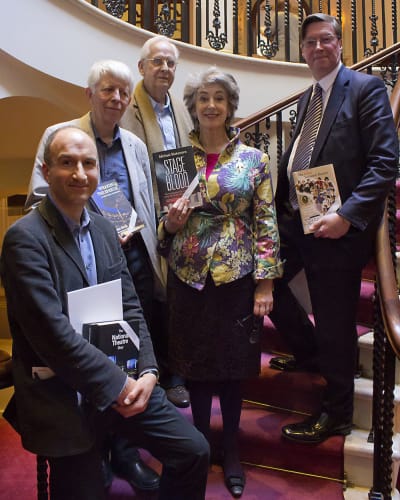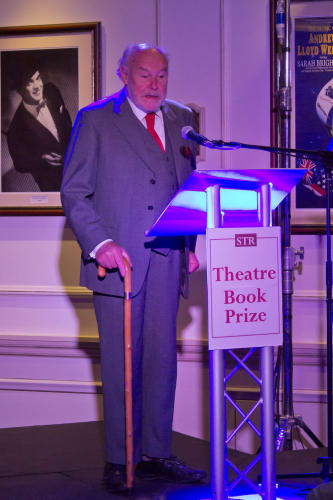Theatre and publishing people mingled with authors, media and academics at the London Palladium on Friday (May 9) for the announcement of the winner of the annual Theatre Book Prize awarded by the Society for Theatre Research, but that announcement came at the end of a presentation that surveyed the nearly 50 theatre books published last year that competed for the prize.
The Society’s President, actor Timothy West, in a break from Eastenders, welcomed guests and spoke briefly about the prize before special guest Maureen Lipman was called on to present awards to the authors who made up the shortlist.
First there was director Michael Blakemore for Stage Blood (Faber), his book about his years at the National Theatre and his conflicts with Peter Hall, then Giles Block, “Master of the Words” at Shakespeare’s Globe, for Speaking the Speech (Nick Hern Books), his excellent book on how to deliver the language of Shakespeare, both briefly responding.
Vin Nardizzi, next up as author of Wooden Os (University of Toronto Press), a book that intriguingly explores the use of wood in Shakespeare’s theatres and of trees in his plays, is an American academic and wasn’t there so Miss Lipman amusingly mimed that presentation.
Daniel Rosenthal (no relation, Miss Lipman pointed out, though she married a Rosenthal) came next for The National Theatre Story (Oberon Books), which looks back to the campaign for a National Theatre as well as detailing its 50 years of existence. Alphabetically last came Robert Whelan author of The Other National Theatre (Jacob Tonson), his study of 350 Years of shows at Drury Lane.
Howard Loxton, STR committeeman and Chair of the judging panel (and one of BTG’s London critics), kicked off the coverage of the year’s books. Covering titles not on the shortlist, those he highlighted included three new volumes in Bloomsbury’s Great Shakespeareans series on the contribution of some leading actors and directors to Shakespeare production—and asking for affordable paperback versions of these readily readable titles which, at £75 each, are out of the reach of most of us.
Judge Charlotte Westenra, director of Lower Ninth and Gladiator Games and winner of an Olivier for her work with Nicholas Kent, followed. Among other books, she drew attention to Lucy Kerbel’s 100 Great Plays for Women (Nick Hern Books) as a treasure trove of wonderful ideas for producers and directors.
In Philip Zeigler’s Olivier (MacLehose Press) she found “his contradictions are clearly drawn and a portrait emerges of someone who could be petty, professionally jealous, cruel, distant, and a philanderer and at the same time be generous, warm, a great actor, a leader and someone who believed in and fought for the right for everyone to have access to great art".
However, she said it was Michael Blakemore’s “wonderful” shortlisted Stage Blood (Faber) to which she turned for a real understanding of the greatness of Olivier’s acting. “ A description of Olivier climbing on a table to change a light bulb in a performance of Long Day’s Journey into Night had me holding my breath. And though I know I’ll never see his James Tyrone I feel I have got as close as it’s possible through Blakemore’s writing.
"Similarly the atmosphere and detail of Blakemore’s production of The Front Page is bought to life in magnificent detail. Clive Merrison crashing through the window shattering glass across the stage or Maureen Lipman throwing herself out of the window with a scream that fell forty feet down is so wonderfully described I feel I was witness to it. Stage Blood highlights the differences between the public spirited Olivier and his dreams for an ensemble-led National and his political savvy, corporate successor Peter Hall.
"Blakemore writes with passion and sometimes rage at how he saw Hall use the National to benefit himself, and his own diaries to rewrite history. Throughout the book, Blakemore gives a well-defined argument for public service theatre and for what a National Theatre should mean to all of us.”
Prof Andy Lavender's (Head of the School of Arts at the University of Sussex) choices included Roger Trayhurn and Mark Child’s All for the Empire, which he found “strangely moving”, calling their book “an act of love, full of the warp and weft of regional theatre.
Robert Whelan’s The Other National Theatre: 350 Years of Shows in Drury Lane he described as “nearly a history of theatre as much as the history of a single theatre… from the backstory of the founding of the Theatre Royal in 1663, through the constructions and extensions of four versions of the building, and the appearances of a compelling cast including Killigrew, Garrick, Sheridan, Siddons and Novello… (that) lives up to the vim and variety of its subject.”
He also expressed his delight in Wooden Os in which “Nardizzi intertwines ecological, economic and theatrical practices, and reveals an entirely new construction of both Shakespearean theatre and early modern Europe, through an unusual eco-cultural approach.”
Third judge, critic Kate Bassett, found many of the year's theatre books enticing, including Nick Hern’s anthology celebrating the twenty-first birthday of his publishing My First Play, a collection of micro-memoirs by his top dramatists, play translators and adaptors about their very first, inspiring brush with the theatre. Also the “incisive and stimulating” Then What Happens? by Mike Alfreds (also published by Nick Hern) which explains a whole array of techniques and exercises you can use to create what he calls story-theatre.
However, it was the other two shortlisted titles to which she gave most of her attention, calling Speaking the Speech “a very practical theatre book which every classical actor should relish, but which ought to be of great interest to literary critics too…. It's as if he's passing a revelatory magnifying glass over passages you thought you knew like the back of your hand.
He is particularly persuasive arguing that the original punctuation, from the First Folio, is more telling than many a modern editor's supposed clarifications. He's also outstanding on the emotional significance of all the minute irregularities in Shakespeare's iambic pentameters (you know all those lines with eleven syllables). He's great at pinpointing big breakthrough moments and stylistic developments in Shakespeare's writing career too, from the endstopped lines of his early plays to the more perturbed and realistic ragged grammar in his later work.”
Finally came The National Theatre Story. “One heck of a tome,” she called it. “We're talking nigh-on 1000 pages (and that is without the footnotes which are online because otherwise you'd have needed to go into weight training just to lift this baby off the shelf). In the wrong writer's hands, such a compendium might also have proved heavy-going, stuffed with statistics about state subsidies and box-office takings from the NT's stacks of archival box files.
“Rosenthal has digested all his research terrifically intelligently, as well as incorporating lively interviews. His writing is quietly eloquent, whilst the rolling story is a compelling page-turner… Some of National's backstairs dramas have been as quite as intriguing as those onstage, with bruising personal clashes behind the scenes… but [it is] all in all, an uplifting tale of fantastic work and happy outcomes. And—by the way—for those of you with delicate biceps, it’s also available as a e-book.”
After expressing the Society’s thanks to the judges, Loxton then called on Maureen Lipman to announce the winner. As some had predicted it was indeed Daniel Rosenthal for The National Theatre Story, a worthy winner for a massive undertaking.

